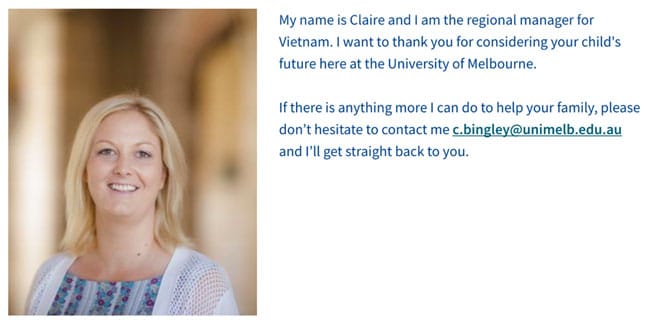The crucial role of parents in international student recruitment and retention
When students are deciding where to study, what do they consider to be the most helpful sources of information? For many, parents are essential influencers. A recent survey conducted by research firm EAB among 5,580 college-bound students found that “more than three-quarters of students (75.6%) indicated that their parents were highly influential, second only to “email from colleges” and higher than the opinions of friends in college or current classmates. Another EAB study of 1,500 parents of college-bound students found that 74% felt that colleges should communicate with them directly.
Stakes are high for parents
The EAB research reinforces other studies that have shown that in recruiting, schools should give greater weight to messaging and outreach for parents. This is especially true when it comes to international students, for whom the risks and rewards of higher education are amplified because of cost, distance, and in many cases, an overarching goal of seeing a foreign education lead to a good job. Parents often shoulder the bulk of the costs for self-funded international students and participate actively as well in applications for scholarships. Higher Education Marketing points out that parental involvement is notably intense in Asia:
“[Parents are particularly likely to assume the leading role in decision-making in] Asian countries that comprise the majority of international student recruitment, especially traditional Confucian cultures like China that value respect and obedience to family authority.”
At a Studyportals “Embracing Change” Academy event held in 2018 in Amsterdam, one university delegate attested to the importance of parents in recruiting when they commented that, “In US fairs, sometimes just the parents turn up.” Others at the event said they saw this in India and China as well, “with parents talking in plural about their children’s options – as in ‘We want to go the States or Germany to study.’”
Parents have unique concerns
Recruiters who have the most success in communicating with parents understand that parents are a distinct segment – one whose concerns and priorities are sometimes different from those of their children. They will want to know all about financial details and possibilities for assistance, about safety and security, and return on investment for graduates from an institution or specific programmes. Graduate success stories and outcomes can go a long way, especially if those stories and proof points involve international students from the same sending country.
When considering messaging to parents, talk with current students about their parents’ mindsets during the research phase of where to study abroad, and ask admissions officers about the main questions that parents had in discussions with them. You may find that the answers you get are quite dependent on which country they are from, which is a good argument for segmenting parent groups and tailoring messaging to these groups accordingly. Sometimes mothers are the most influential, and sometimes fathers are, as illustrated in this article from University World News which draws in part on results from an i-graduate survey conducted among 8,500 postgraduate and undergraduate students planning to go abroad to study in an English-taught programme.

Different markets, different approaches
Knowledge of your target markets’ unique characteristics is another helpful layer to add in when developing parent profiles. For example, in Vietnam, study abroad is becoming more and more of a trend, thanks to an expanding middle class as well as persistent quality concerns in higher education. Parents have witnessed many young Vietnamese graduates struggle to find jobs despite university degrees. Another example is Indonesia, where the most pressing barrier for students considering study abroad is safety and security. Financial concerns also loom large: nearly half (45%) of recently surveyed Indonesian students say they can go abroad for study only if they get some scholarship support. Every market will have its pressing issues for parents and knowing these is the key to showing how your institution can help to solve problems and encourage the best outcomes for students.
Beyond recruitment and into retention
It is more than good manners to prioritise regular outreach to international parents after their students are enrolled in your school and attending classes. As Julie L. Bryant, associate vice president of retention solutions at Ruffalo Noel Levitz, explains,
“[Their] guiding role does not end when students enter their college experience. Parents can have tremendous influence on student retention as well, something that institutions need to keep in mind. Colleges have an opportunity to use parental influence to their advantage—if parents are given the right information.”
The fact is, the parents of international students are very invested in seeing their children complete their foreign degrees. They have often played a key role in convincing their children to attend a particular institution and are often financing the study abroad. But degrees take time, and as parents, they want to see their children enjoying their experience – being happy and successful, making friends and taking part in activities. So the best thing to do is to really let them in on the experience, so they can talk about it with their children, reducing homesickness and providing encouragement for students to get as involved as possible.
For starters, devote space for parents on the institutional web site. Parents should see a callout to them on the homepage, ideally in the navigation bar or via a very prominent call out button. When they click there, they should find a wealth of resources and opportunities just for them. It should be abundantly clear that there is room for them to connect to their children’s experience. Higher Education Marketing notes that the University of Colorado Boulder does a great job of:
“Giving a sense of an inclusive community, welcoming parents to their “family” and offering a wealth of clearly laid out resources and opportunities to get involved. This includes submitting favourite family recipes, contributing to the “Parent Fund,” and supporting recruitment of other students by writing notes, making calls or volunteering at college fairs.”
















